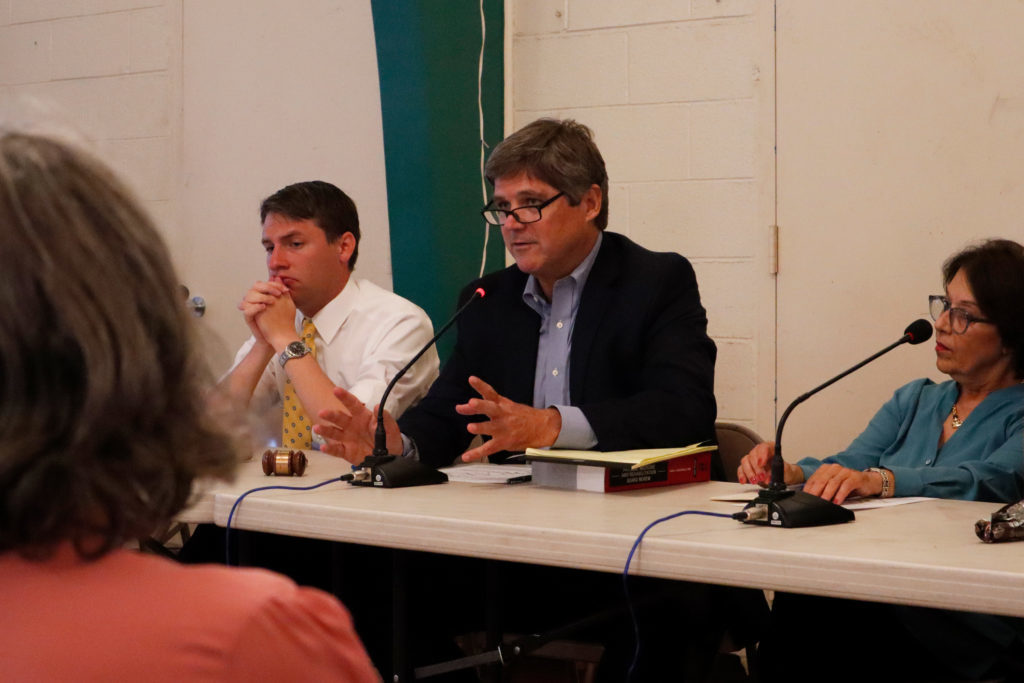Updated: September 13, 2019 at 11:55 a.m.
Foggy Bottom residents met with officials and local politicians Wednesday to discuss how GW will house students off-campus while Thurston Hall is renovated.
About 20 residents and District leaders met at St. Paul’s Episcopal Church to discuss details of the renovation plans, including how students will be housed outside of the University’s zoning boundary during construction and what the renovation timeline, which begins at the end of the academic year, will entail. Officials said they will leave the exterior of the building intact while they gut the residence hall, and about 200 fewer students will live in Thurston Hall once renovations are completed.
Officials approved renovations to the building in May after scrapping a proposal to build an entirely new residence hall.
At a West End and Foggy Bottom Advisory Neighborhood Commission meeting in May, officials said students will live in off-campus buildings like Aston Hall and One Washington Circle Hotel while construction to the freshman residence is underway. Freshman enrollment will also be cut by about 100 students, and officials will admit 50 more students to study abroad programs to accommodate fewer housing options.
Alicia Knight, the senior associate vice president of operations, said officials will gut Thurston Hall and leave the exterior of the building in place during construction. Knight said officials will “de-densify” the residence hall to house 820 students instead of the 1,080 who currently live in Thurston.
“We’re not trying to pack them in, we’re not trying to create Thurston 2.0 in terms of density,” she said.
Officials will also spend six weeks transforming One Washington Circle Hotel into a residence hall to house third and fourth-year students during the hall’s renovations, Knight said.
Associate Dean of Students Colette Coleman said a staff member will live in One Washington Circle, the Aston and 1959 E St. while third and fourth-year students are placed in the buildings. Within weeks of living in the off-campus buildings, residents will receive a welcome letter and an invite to a welcoming event and community meeting to discuss expectations as a member of the D.C. community, Coleman said.
David Avitable, the University’s attorney who attended the meeting, said One Washington Circle Hotel will be converted back into a commercial hotel once renovations are finished.
“I don’t think we’re trying to be particularly clever or creative in the position we’re taking here,” Avitable said. “That’s not the intent of this. We’re just trying to do this as simple and straightforward as possible.”
The neighborhood agreement drafted by the ANC states the University need to pay $1 million to the Foggy Bottom Defense and Improvement Corporation for each semester that students live in the off-campus residence halls longer than the time agreed upon per the terms of the that agreement.
Renovations are slated to span from June 2020 to fall 2022, but officials said they are modifying the Campus Plan to house third- and fourth-year students outside of the D.C. Zoning Commission regulations for only those two years. ANC commissioners will vote on the drafted agreement at the commission’s monthly meeting next Wednesday.
Sally Blumenthal, a Foggy Bottom resident, asked commissioners and officials how they are certain that the project will remain on schedule because the project is pending D.C. Zoning Commission approval.
“You have no idea who’s going to show up to these meetings with thoughts about this that hasn’t been part of this process, which will set your clock back, and you have a process that has to give you a decision relative to a campus plan,” Blumenthal said.
Knight, the senior associate vice president of operations, said the University has begun negotiations with District agencies involved in the process, like the Commission on Fine Arts and the Historic Preservation Office, which approves renovations to historic buildings like Thurston Hall.
Former ANC commissioner Florence Harmon said the D.C. Zoning Commission’s regulations for changing One Washington Circle Hotel into a temporary residence hall are unclear. She said the University should request off-campus housing exemptions from students who want to live outside of the Campus Plan boundary through a separate amendment.
“I’m shocked at anybody saying it doesn’t need an amendment to the campus plan or a modification of the Campus Plan,” Harmon said.
ANC chairman William Kennedy Smith said the ANC is not taking a stance on whether converting the hotel to a residence hall should go through a Campus Plan amendment or through a certificate of occupancy.
“I have asked our attorney whether that in any way creates a precedent, in my understanding from the response I got back was the answer is ‘no,'” Smith said.
This post has been updated to correct the following:
The Hatchet reported that Florence Harmon is an ANC commissioner. Harmon is a former commissioner. This post was also updated to clarify that GW will be fined $1 million for every semester that students live in off-campus residence halls longer than the time frame designated by the ANC’s agreement, not by the Campus Plan. We regret these errors.





